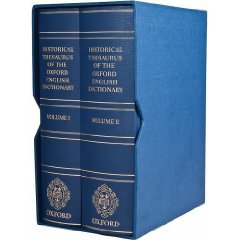Thesaurus Plus Context
 BBC News brings word (via) that after a 44 year effort, the Historical Thesaurus of the Oxford English Dictionary will see the light of day. Rather than simple links between words, the beastly volume covers the history of the words within. For instance, the etymological timeline of the word “trousers” follows:
BBC News brings word (via) that after a 44 year effort, the Historical Thesaurus of the Oxford English Dictionary will see the light of day. Rather than simple links between words, the beastly volume covers the history of the words within. For instance, the etymological timeline of the word “trousers” follows:
trousers breeks 1552- · strosser 1598-1637 · strouse 1600-1620 · brogues 1615- a 1845 · trouses 1679-1820 · trousers 1681- · trouser 1702- ( rare ) · inexpressibles 1790- ( colloq. ) · indescribables 1794-1837 ( humorous slang ) ·etceteras 1794-1843 ( euphem. ) · kickseys/kicksies 1812-1851 ( slang ) · pair of trousers 1814- · ineffables 1823-1867 ( colloq. ) · unmentionables 1823- · pantaloons 1825- · indispensables a 1828- ( colloq. euphem. ) · unimaginables 1833 · innominables 1834/43 ( humorous euphem. ) · inexplicables 1836/7 · unwhisperables 1837-1863 ( slang ) · result 1839 · sit-down-upons 1840-1844 ( colloq. ) · pants 1840- · sit-upons 1841-1857 ( colloq. ) · unutterables 1843; 1860 ( slang Dict. ) · trews 1847- · sine qua nons 1850 · never-mention-ems 1856 · round-me-houses 1857 ( slang ) · round-the-houses 1858- ( slang ) · unprintables 1860 · stove-pipes 1863 · terminations 1863 · reach-me-downs 1877- · sit-in-’ems/sitinems 1886- ( slang ) · trousies 1886- · strides1889- ( slang ) · rounds 1893 ( slang ) · rammies 1919- ( Austral. &S. Afr. slang ) · longs 1928- ( colloq. )
Followed by a proper explanation:
breeks The earliest reference from 1552 marks the change in fashion from breeches, a garment tied below the knee and worn with tights. Still used in Scotland, it derives from the Old English “breeches”. trouser The singular form of “trousers” comes from the Gallic word “trews”, a close-fitting tartan garment formerly worn by Scottish and Irish highlanders and to this day by a Scottish regiment. The word “trouses” probably has the same derivation. unimaginables This 19th Century word, and others like “unwhisperables” and “never-mention-ems”, reflect Victorian prudery. Back then, even trousers were considered risque, which is why there were so many synonyms. People didn’t want to confront the brutal idea, so found jocular alternatives. In the same way the word death is avoided with phrases like “pass away” and “pushing up daisies”. stove-pipes A 19th Century reference hijacked in the 1950s by the Teddy Boys along with drainpipes. The tight trousers became synonymous with youthful rebellion, a statement of difference from the standard post-war suits. rammies This abbreviation of Victorian cockney rhyming slang “round-me-houses” travelled with British settlers to Australia and South Africa.
Are you seeing pictures and timelines yet? Then this continues for 600,000 more words. Mmmm!
And Ms. Christian Kay, one of the four editors, is my new hero:
An English language professor, Ms Kay, one of four co-editors of the publication, began work on it in the late 1960s – while she was in her 20s.
It’s hard to fathom being in your 60s, and completing the book that you started in your 20s, though it’s difficult to argue with the academic and societal contribution of the work. Her web page also lists “the use of computers in teaching and research” as one of her interest areas, which sounds like a bit of an understatement. I’d be interested in computers too if my research interest was the history 600,000 words and their 800,000 meanings across 236,000 categories.
Sadly, this book of life is not cheap, currently listed at Amazon for $316, (but that’s $79 off the cover price!) Though with a wife who covets the full 20 volume Oxford English Dictionary (she already owns the smaller, 35 lbs. version), I may someday get my wish.

